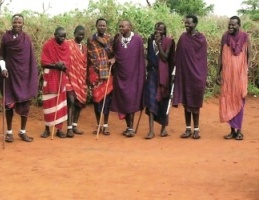Kenya
City Of Kenya
- Nairobi
- Mombasa
- Malindi
- Chogoria
- Embu
- Eldoret
- Garissa
- Homa Bay
- Isiolo
- Kajiado
- Kakamega
- Kendu Bay
- Kericho
- Kilifi
- Kissi
- Kisumu
- Kitale
- Kitui
- Kwale
- Lamu
- Limuru
- Lodwar
- Maralal
- Marsabit
- Meru
- Naivasha
- Nakuru
- Nanyuki
- Narok
- Nyahururu
- Nyeri
- Taveta
- Thika
National Parks
- Aberdare
- Amboseli
- Hell's Gate
- Ndere Island
- Kerio Valley
- Lake Nakuru
- Malka Mari
- Marsabit
- Meru
- Mombasa
- Mount Kenya
- Mount Longonot
- Nairobi
- Ruma
- Tsavo East
- Tsavo West
- Sibiloi
- Arabuko Sokoke Forest
- Victoria Lake
National Reserves
- Arawale
- Boni
- Dodori
- Tana River Primate
- Kakamega Forest
- Kiunga
- Kora
- Rahole
- Masai Mara
- Mpunguti
- Shimba Hills
- South Kitui
Marine Parks
Marine Reserves
Provinces of Kenya
The History of Kenya
The fossil discovered on the territory of Kenya suggest that the primates lived already in this area of the planet more than 20 million years ago and the hominids as Homo habilis (1.8 - 2.5 million years ago) and Homo erectus (1.8 million - 350,000 years ago) are the possibly direct ancestor of Homo sapiens (1.8 million - 10,000 years ago). Around 2000 BC on the land of Kenya came from Ethiopia some nomadic tribes followed by other tribes from all over Africa.
The Arab and Persian traders began to frequent the coasts of Kenya around the first century AD , setting up permanently in villages by the sea from the eighth century AD, with the main purpose of exchanging goods with ivory and slaves.
The Swahili culture was born from the Arab peoples and the indigenous Bantu. So the tribes began the migration into the interior of the country. Later in the fifteenth century came the Portuguese who traded spices, but at the same time pillaged and occupied the indigenous city. The great Portuguese explorer Vasco de Gama arrived in the town of Malindi in 1498.
The Portuguese imposed their colonial regime until the first half of the eighteenth century when the Arabs retake the control of the coast. Then began the Omani dynasties that controlled the coast but not the interior of the country. Because of the tensions between the Arab governors, the region enters a period of economic and commercial decline. After the invasion of Africa by the "whites" even the interior regions of Kenya were revealed to foreigners.
 The warrior tribe of Masai , mainly due to the presence of foreigners who brought with them unknown viruses to Africa, was weakened by disease and famine that initiate their decline. The great Masai warriors were forced by white settlers in the smaller and smaller reserves and from the Kikuyu tribe of farmers the lands were taken. In the early years of the twentieth century, the land belonged to the European farmers who created plantations of coffee and tea on the lands of the Kikuyu tribe, who did not know how to claim their lands in european terms.
The warrior tribe of Masai , mainly due to the presence of foreigners who brought with them unknown viruses to Africa, was weakened by disease and famine that initiate their decline. The great Masai warriors were forced by white settlers in the smaller and smaller reserves and from the Kikuyu tribe of farmers the lands were taken. In the early years of the twentieth century, the land belonged to the European farmers who created plantations of coffee and tea on the lands of the Kikuyu tribe, who did not know how to claim their lands in european terms.
With the passage of time it began to increase the opposition to the colonial regime, associations as Kenya African Union joined togheter claiming the right of freedom for the peoples of Kenya. In 1956 the Mau Mau rebellion was defeated by the colonialists with a tribute of over 13 thousand African dead, but it was only the victory of one battle that didn't waste the souls and the will for the freedom of Kenyan people. On 12 December 1963, Kenya finally achieved its independence by becoming one of the most stable and prosperous nations in Africa. Jomo Kenyatta (the real registry name is Johnstone Kamau) was the first president of the new independent Kenya. Kenyatta was the political successor to Harry Thuku, one of the first leader of the Kikuyu, former founder in 1921 of the East African Association, imprisoned by the British in 1922, without having committed crimes.
After the death of Jomo Kenyatta, occurred in 1978, came to the power, becoming the second president of Kenya, Daniel Arap Moi from the tribe of Tugen. Moi ordered the dissolution of the university and the dissolution of the tribal societies. Under the new government the internal tensions had a new intensification, so the Kenyan Air Force, with its aviation division, in 1982 attempted a state stroke but failed because of the military apparatus loyal to President Moi that was the best, dismantling the aeronautics.
The international help to support Kenya led by the President (dictator) Moi was stopped, then the IMF asked Moi to loosen the grip of political oppression and keep a democratic behavior towards the people of Kenya, in return Kenya would have international help again. Daniel Arap Moi accepting the "conditions" of the IMF won the re-election in 1993 and also ones of (much discussed) the 1997. In the 2002 elections, former President Moi for already 24 years, tried to change the constitution in order to reapply, but didn't succeed, so as President was elected Mwai Kibaki leading to a profound change in government policy and introducing a new democracy in Kenya.










